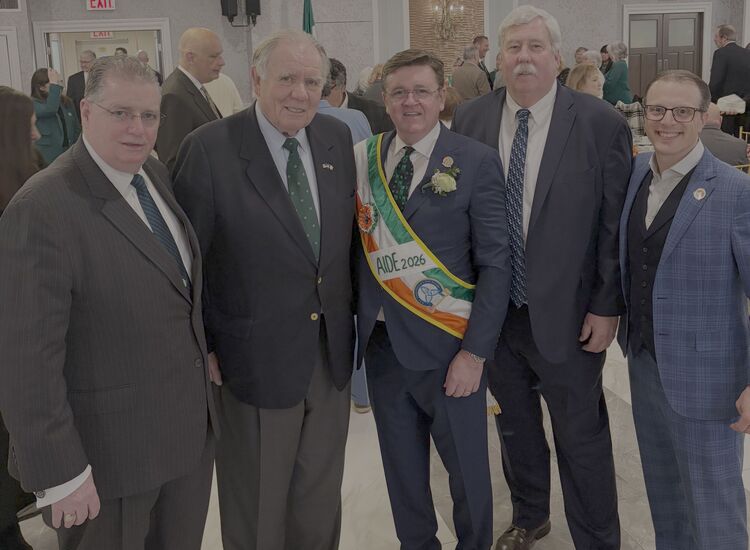By Stephen Butler
James Joyce’s “Ulysses,” you’ve probably heard by now, is the story of a day in the intersecting lives of three Dubliners: the brooding young scholar, Stephen Dedalus; the wandering cuckold, Leopold Bloom; and Bloom’s sensuous wife, Molly. The entire novel is set on June 16, 1904, and hence the appellation Bloomsday. What is perhaps less well-known, or less understood, is that Leopold Bloom is an Irish Jew and that Joyce conceived of his great novel as “the epic of two races (Israel-Ireland).”
The novel began as a germ of an idea for a short story about a character based on a man named Alfred H. Hunter. Hunter was rumored to be Jewish and to have an unfaithful wife, and legend has it that he had once done Joyce a good deed, helping the drunken young genius get home after a scrape over a girl in St. Stephen’s Green. The short story based on Hunter was never written, but the character of a Good Samaritan Dublin Jew whose wife cheats on him grew and evolved into the Bloom of “Ulysses.”
During Joyce’s time living in Ireland, 1882-1904, the Jewish population was well-integrated into Irish life, though admittedly the size of this demographic was quite small, numbering only a few thousand across the whole island. In “Ulysses,” Joyce alludes to these facts at the end of the second chapter, when Stephen’s boss, the schoolmaster Mr. Deasy, makes a dark joke of them: “Ireland, they say, has the honor of being the only country which never persecuted the jews. Do you know that ? No. And do you know why? . . . Because she never let them in, Mr. Deasy said solemnly. . . She never let them in, he cried again through his laughter as he stamped on gaitered feet over the gravel of the path. That’s why.” Given the dearth of his experience interacting with Jewish people in Ireland, a natural question arises: how did Joyce come to know enough about this race to try to compose their epic?
One can find a persuasive answer to this question in John McCourt’s excellent book “The Years of Bloom: James Joyce in Trieste 1904-1920.” McCourt chronicles Joyce’s long, fruitful residence in this bustling port on the Adriatic Sea, a linguistic melting pot that had long been part of the Austro-Hungarian Empire but whose politics was animated by the agitation of Italian nationalists, a metropolis whose commercial and cultural life was supported in large part by cosmopolitan, assimilated Jews. It was in Trieste that Joyce became personally acquainted with a number of Jewish men and women, many of whom employed him as an English tutor. These students and friends, like the writer Ettore Schmitz (pen name Italo Svevo), helped Joyce develop and flesh out the character of Bloom. McCourt also notes that Trieste was “one of the centres of the Zionist movement in Europe” and as such, “Joyce read quite deeply into the subject and owned books such as Herzl’s ‘The Jewish State’ and Sacher’s ‘Zionism and the Jewish Future.’” McCourt explains that one of the most “ardent” of the Zionists who Joyce tutored and befriended in Trieste was Moses Dlugacz. In ‘Ulysses,’ Joyce gives this name to the butcher who sells Bloom the kidney he fries for his famous breakfast. The butcher wraps the meat in a newspaper advertising “the model farm at Kinnereth on the lakeshore of Tiberias” which references a real Zionist scheme set up by an entity called the Palestine Land Development Company.
McCourt’s research provides an important corrective to the claim that “[Joyce] knew little of Zionism,” which Richard Ellmann asserted in his much more famous and influential biography. Though he was incorrect about Joyce’s knowledge of Zionism, Ellmann at least provides this rich anecdote: “When one day [a friend named] Weiss commented on the possibility of a Jewish state, Joyce wryly remarked, ‘That’s all very well, but believe me, a warship with a captain named Kanalgitter and his aide named Captain Afterduft would be the funniest thing the old Mediterranean has ever seen.’”

The first edition of "Ulysses."
Reading this quip in June 2021, one cannot help but wonder what Joyce would have thought about a former Captain in the Special Reconnaissance Unit of the Israel Defense Forces named Netanyahu. Joyce had a remarkable sense of humor, but he also abhorred violence, so it’s doubtful he would have found the destruction and death ordered in recent weeks by now Prime Minister Netanyahu funny at all.
But one also wonders what Joyce would have thought about Ireland becoming the first European nation to condemn Israel’s actions in Gaza and the West Bank as “de facto annexation.” Clearly, many Irish politicians and citizens empathize with the terrible plight of the Palestinians—a recent Al Jazeera article by Ruairi Casey explains that “in the Irish political imagination, Palestine feels much closer [to Ireland], with both perceived as sharing a history of struggle against colonialism and oppression.” Joyce died in 1941, seven years before the establishment of the state of Israel, and surely his opinions could have changed given political developments in the Holy Land, but the evidence suggests that during his life Joyce did not perceive the Zionist movement as akin to settler colonialism practiced by the British in Ireland. To the contrary, it’s clear that Joyce saw numerous parallels between Zionism and Irish nationalism. In the penultimate chapter of Ulysses, Joyce makes the “points of contact” between the people of Israel and Ireland explicit in a long list which includes “the restoration in Chanah David of Zion and the possibility of Irish political autonomy.”
Ironically, earlier in the novel, an ardent nationalist known as the Citizen drunkenly insinuates that Bloom’s suspected Zionist sympathies are irreconcilable with Irish patriotism: “What is your nation if I may ask? Says the citizen. Ireland, says Bloom. I was born here. Ireland . . . And I belong to a race, too, says Bloom, that is hated and persecuted. Also now. This very moment. This very instant . . . Robbed, says he. Plundered. Insulted. Persecuted. Taking what belongs to us by right . . . Are you talking about the new Jerusalem? Says the citizen. I’m talking about injustice, says Bloom.” Clearly here, Joyce is highlighting for readers a shared history of Irish and Jewish dispossession and diaspora, a history that haunts the present day conflict between Israelis and Palestinians.
Interestingly, one of the barflies at Barney Kiernan’s pub who has been listening to the conversation advocates a violent response to the injustice Bloom describes: “Right, says John Wyse. Stand up to it then with force like men.” But Bloom rejects this sentiment: “It’s no use, says he. Force, hatred, history, all that. That’s not life for men and women, insult and hatred. And everybody knows that it’s the very opposite of that that is really life . . . Love, says Bloom. I mean the opposite of hatred.”
This Bloomsday left us offer a prayer, naïve as it may be, that the real life of men and women might somehow prevail against the destructive forces of history that so often turns life into a waking nightmare none of us can escape.
Stephen Butler, Ph.D, is Senior Lecturer, Expository Writing Program, New York University.









